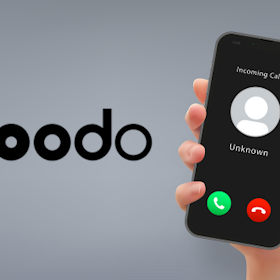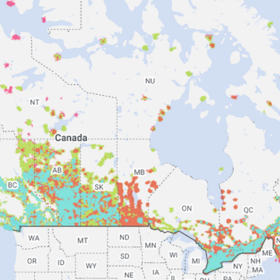
How Much Data Does YouTube Use?
- Typical mobile use streaming HD YouTube videos consumes 600MB per hour
- Changing your quality settings to SD can reduce YouTube data usage to 250MB per hour
- YouTube Premium offers the ability to download videos for offline playback
- Not all unlimited plans in Canada support video streaming on throttled speeds
The amount of bandwidth (data per second) that YouTube videos use can vary greatly—unlike streaming music, which is usually fixed. So exactly how much of your precious data will that viral video cost you?
WhistleOut Canada's experts tested YouTube mobile data use over 4G LTE at 480p and 1080p resolutions, which reflects the most common usage models for mobile YouTube streaming in Canada, to provide you data use rates for a variety of popular video categories. We'll also help you figure out how you can minimize data use and where to find the best cell phone plan to get your YouTube fix.
How Much Data Does YouTube Use?
With typical use, mobile YouTube data usage is about 250MB per hour in Standard Definition (SD) mode or 600MB per hour in High Definition (HD) quality. A single 5-minute video will use 20MB of data in SD or 50MB in full HD. Actual results may vary depending on whether you’re on a smartphone, desktop or smart TV.
| Stream quality | Data per minute (MB) | Data per hour (MB) |
|---|---|---|
| 1080p (Full HD) | 12 MB | 600 MB |
| 720p (HD) | 7 MB | 400 MB |
| 480p (SD) | 4 MB | 250 MB |
| 240p (144p widescreen) | 2 MB | 120 MB |
Data use based on samples taken using the YouTube app in November 2020. Actual rates may vary depending on varying factors including device, connection type and content.
A word about YouTube streaming quality
YouTube video streams don’t use a fixed bandwidth like audio streams do—instead, the quality of a clip is set by choosing a playback resolution from quarter-SD (144p) up to 8K (4,320p).
While researching for this guide, we found that different web sites that cover this topic can feature wildly different results. This is because YouTube changes video quality depending on a variety of factors, including connection method (Wi-Fi vs. mobile), platform (desktop vs. smartphone) and resolution. Even the complexity of the content can affect stream size, as simple animation can be compressed more than live-action video.
Most smartphones limit maximum resolution to 1080p, and YouTube has a data-saving option that can limit streams to 480p (or 360p in widescreen mode). For the purposes of this article, we will use those two resolutions on a smartphone with mobile connection.
YouTube data use by video type
An average YouTube video is 11.7 minutes long, but that doesn't reflect how you might personally use the service. Most video blogs and music videos are a quick 5 to 8 minutes in length, while the average gaming video is around a whopping half hour long. Also, watching YouTube videos just like eating potato chips—you can’t have just one
Below are a few examples of data use to consider before clicking on that “Up next” video:
YouTube mobile data usage by video length:
| Type | SD (480p) | HD (1080p) | |
|---|---|---|---|
| |
Funny Cat Video 30 seconds |
2 MB | 5 MB |
| |
Music Video 5 minutes |
20 MB | 50 MB |
| Video Blog 8 minutes |
35 MB | 80 MB | |
| |
WhistleOut TV 10 minutes |
42 MB | 100 MB |
| |
Gaming Stream 30 minutes |
125 MB | 300 MB |
YouTube data use over time
Whether you watch viral videos or use YouTube to enjoy your tunes, data use can add up quickly. Video requires a lot more data than music streaming—watching 1080p video on your cell phone for just an hour each day can burn through a 10GB data plan in under a month!
Even though YouTube can play 4K video streams, most smartphones only support 1080p – commonly referred to as HDTV resolution. At that level of quality, one hour of video streaming uses 600MB of data. Setting your video to SD resolution (or 480p) uses only uses 250MB per hour. The quality is about the same as you’d find on an old DVD, but many smartphones enhance video playback, making it look nearly as good as HD.

YouTube data use by month
Your streaming quality, connection type, and personal usage habits all decide the amount of data you can expect to use via YouTube in a given month. To make it easy, let's pretend you watch or listen to YouTube videos as a passenger during a daily commute—because you're far too responsible to watch distracting videos while behind the wheel!
A one-hour commute, two times per day, over an average of 22 workdays results in 44 hours of playback. If you keep your video streams down to SD resolution, you’ll only use 11GB of data. However, if you need to get your fix in HD, you’ll need a plan with over 30GB of monthly data.
There are unlimited data plans available in Canada but going over a monthly soft data limit throttles your data speeds. You can continue downloading, but you’re severely limited in what you can stream. Read the section below about unlimited data plans to learn more about limitations when streaming YouTube videos on throttled data speeds.
How to Use Less Data in YouTube
Streaming at a lower resolution is the easiest way to reduce data use and keep your data plan down to a manageable monthly rate. However, YouTube’s default settings try to play videos at the best possible quality. We’ve listed some additional ways to cut wireless data use while maximizing your video streaming experience.
Change video quality in YouTube
From the main screen when you first open the YouTube app, tap on your Account image at the top right. Several options are available with “Settings” near the bottom. Tap on Settings, then General.
- Switch on Limit mobile data usage. This keeps video streams to SD resolution when it detects that you’re not on a Wi-Fi connection.
- Tap Uploads and select Only when on Wi-Fi to prevent any video uploads from starting while you’re still on mobile data.
Head back out to the Settings page and tap on Autoplay.
- Disable Autoplay next video to stop “Up next” videos from downloading automatically.
Download for offline playback in YouTube
YouTube Premium is a monthly subscription service that unlocks several exclusive benefits, including the option to download videos. Tapping on the Download option for any video also lets you choose your bandwidth, ranging from 144p up to Full HD (1080p). File size is conveniently listed before you download, so you can choose a smaller file if your smartphone has limited space. Downloading videos for offline play is not allowed with free YouTube accounts.
Downloads remain on your device for 30 days. You can download any videos that you otherwise have permission to watch. This means that region-locked videos may not work if, for example, you download in the U.S. then try to play back in Canada.

Track data use by YouTube
Even though the YouTube app doesn’t clearly indicate how much data you’re using, your smartphone is paying attention. To see how much data the YouTube app (or other apps) are using each month, look for Mobile Data in your device settings on iPhone, or Mobile Network configuration on Android devices. Your mobile carrier also lets you track overall data use by logging into your account through the company’s website or My Account app.
Can I Watch YouTube on Unlimited Data Plans?
Bell, Rogers and Telus throttle unlimited data speeds to 512 kbps, which isn’t quite fast enough for streaming 480p video. However, YouTube automatically drops down to 360p resolution (or lower) in order to maintain playback. This is a great feature of YouTube, whereas other streaming services like Netflix force you to wait while the video preloads or “buffers”. YouTube content will look blurry on unlimited data with these three carriers, but it should still stream.
Freedom Mobile limits bandwidth to 256 kbps. That makes streaming YouTube a struggle for all but the lowest video quality settings. Lucky Mobile and Chatr throttle your unlimited data speeds far too much to allow YouTube streaming.
SaskTel mobile customers with qualifying unlimited data plans have 2 Mbps throttled speeds and can continue streaming YouTube in high definition. We still recommend you reduce the resolution to 480p and limit dropouts or buffering.
Best Phones for Watching YouTube
Most smartphones come with massive screens and resolutions that rival your HDTV, making them great for watching while on the go. However, if you want the best experience, look for a display that uses OLED technology. With brighter images and sharper colours, OLED displays can even be found on cheap midrange smartphones like the Samsung Galaxy A51.

Apple fans will need to spring for the iPhone 15 if they want the highest video quality, though there are other options in the iPhone family.
Related Articles
Find Better Phones and Plans
Hundreds of cell phone plans unpacked. All the facts. No surprises.





































